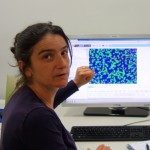Lien vers Pubmed [PMID] – 17110197
Meth. Enzymol. 2006;414:266-83
Cell-based assays are powerful tools for drug discovery and provide insight into complex signal transduction pathways in higher eukaryotic cells. Information gleaned from assays that monitor a cellular phenotype can be used to elucidate the details of a single pathway and to establish patterns of cross talk between pathways. By selecting the appropriate cell model, cell-based assays can be used to understand the function of a specific cell type in a complex disease process such as inflammation. We have used human umbilical vein endothelial cells to establish three cell-based, phenotypic assays that query different stages of a major signaling pathway activated in inflammation. One assay analyzes the tumor necrosis factor alpha (TNFalpha)-induced translocation of the transcription factor NF-kappaB from the cytoplasm into the nucleus 20 min after stimulation with TNFalpha. Two more assays monitor the expression of E-selectin and VCAM-1, 4 and 24 h after stimulation with TNFalpha. Indirect immunofluorescence and high-throughput automated microscopy were used to analyze cells. Imaging was performed with the IN Cell Analyzer 3000. All assays proved to be highly robust. Z’ values between 0.7 and 0.8 make each of the three assays well suited for use in high-throughput screening for drug or probe discovery.




